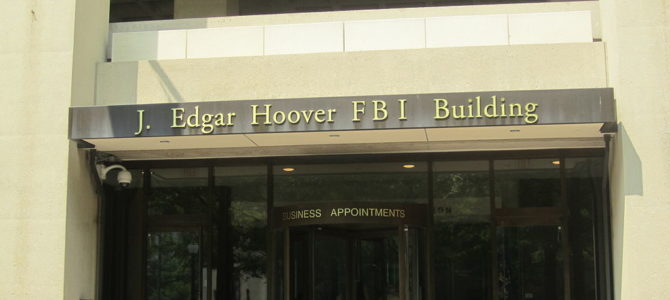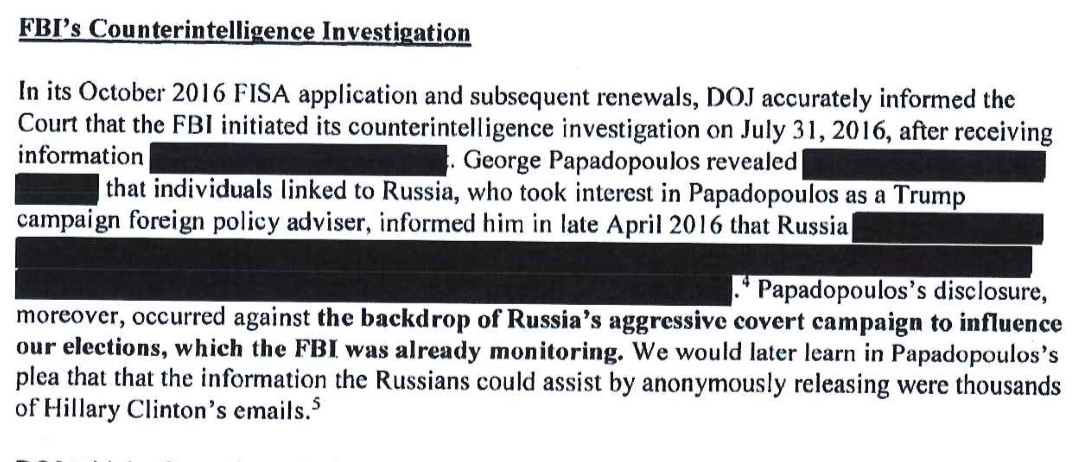
It might be time for the Federal Bureau of Investigation to revise its Russia-Trump collusion origin story again. First, they said the whole thing started with the Christopher Steele dossier. When that fell apart, the beginning became a random conversation between a Trump campaign staffer and a foreign diplomat. But an examination of the George Papadopolous explanation—that the FBI kicked into gear once it was told a Trump affiliate was trawling for hacked emails—shows that the public evidence doesn’t fit the bureau’s story.
The FBI has long maintained that it launched its investigation into the Trump campaign on July 31, 2016, upon learning that Trump foreign policy advisor Papadopoulos knew the Russians possessed “dirt” on Hillary Clinton. Following a December 31, 2017, New York Times article, the narrative then ran that Papadopoulos had told Australian diplomat Alexander Downer that “Moscow had thousands of emails that would embarrass Mrs. Clinton, apparently stolen in an effort to try to damage her campaign.”
This Narrative Is Getting Fresh Eyes
In the last month, those covering Spygate have revisited that narrative, and after a careful re-reading of the Times article, noted it does not actually say that Papadopoulos told Downer that the Russians had Clinton’s emails. To the contrary, the article admits “how much Mr. Papadopoulos said that night at the Kensington Wine Rooms with the Australian, Alexander Downer, is unclear.”
Yet the Times asserted that when WikiLeaks began releasing the hacked Democratic National Committee emails in July, “Australian officials passed the information about Mr. Papadopoulos to their American counterparts.. . .[And] [t]he hacking and the revelation that a member of the Trump campaign may have had inside information about it were driving factors that led the F.B.I. to open an investigation in July 2016 into Russia’s attempts to disrupt the election and whether any of President Trump’s associates conspired.”
Downer has since denied telling his higher-ups that Papadopoulos mentioned Clinton’s emails. In an interview with The Australian, as Chuck Ross recently highlighted in The Daily Caller, Downer said Papadopoulos merely told him the “Russians might use material that they have on Hillary Clinton in the lead-up to the election, which may be damaging.” Papadopoulos “didn’t say dirt; he said material that could be damaging to her.” Downer also stressed Papadopoulos “didn’t say what it was.”
But we don’t need to take Downer’s word on the matter. And we should have realized months ago that the FBI’s decision to open the investigation on the Trump campaign had nothing to do with Papadopoulos’s purportedly drunken reference to Clinton’s emails.
How? By reading the footnotes in the response memorandum Rep. Adam Schiff (D-CA) released to counter the memorandum House Permanent Select Committee on Intelligence Chairman Devin Nunes (D-CA) had issued on Foreign Intelligence Surveillance Act abuse.
What the Footnotes Said
In his memo, Schiff notes that the “DOJ accurately informed the Court that the FBI initiated its counterintelligence investigation on July 31, 2016” based on information Papadopoulos had revealed. While the details of what Papadopoulos revealed (and to whom) remain redacted, unredacted footnote five states: “Papadopoulos’s October 5, 2017 guilty plea adds further texture to this initial tip, by clarifying that a Russian agent told Papadopoulos that ‘They [the Russians] have dirt on her’; ‘the Russians had emails of Clinton’; ‘they have thousands of emails.’”
Papadopoulos’s guilty plea came more than one year after the FBI initiated its counterintelligence investigation of the Trump campaign and, as Schiff put it, “adds further texture to this initial tip.” He means the tip that spawned the investigation of the Trump campaign did not reference Clinton’s emails.


So, what prompted the launch of operation Crossfire Hurricane? Papadopoulos merely stated that “Russians might use material that they have on Hillary Clinton in the lead-up to the election, which may be damaging.” That statement cannot possibly justify opening a counterintelligence investigation on a presidential campaign. Half the world expected that at the time. This is likely why The New York Times, relying on leaks from insiders, wordsmithed its story to create the false impression that Papadopoulos had bragged to Downer about hacked emails.
What Else Is In That Memo
Revisiting the Schiff memo reveals two additional points of note: The memo states “individuals linked to Russia” “took interest in Papadopoulos as a Trump campaign foreign policy adviser.” While Papadopoulos would later admit these facts in his Statement of Offense, how did the FBI know these facts on July 31, 2016 (or in October 2016, when the DOJ sought the initial FISA application for Carter Page)? The first FBI interview of Papadopoulos, according to court documents, occurred in January 2017.
The FBI might easily learn that Papadopoulos worked at the London Centre for International Law Practice with Joseph Mifsud, the professor with the Russia connections. Agents also could quickly discover Mifsud’s links to Russia. But how did the FBI know before October 2016 that Mifsud “took interest in Papadopoulos as a Trump campaign foreign policy adviser?”
Had the FBI obtained a court order to intercept Papadopoulos’ electronic communications before obtaining the FISA warrant to intercept Page’s communications in October 2016? On what basis—his mention that the Russians might have information damaging to Hillary? Or did the FBI have another source familiar with Mifsud’s interest in Papadopoulos? Mifsud himself?
Second, in footnote five, in referencing the Statement of Offense, Schiff refers to Mifsud as “a Russian agent.” But the Statement of Offense filed in Papadopoulos’s case never claims Mifsud was a Russian agent. Further, last week Lee Smith dismantled the narrative that Mifsud was a Russian agent, detailing evidence which, if anything, casts him as an asset to Western intelligence agencies. But which Western intelligence agency?
According to excerpts from their forthcoming book, “The Faking of Russia-Gate: The Papadopoulos Case,” Stephan Roh and Thierry Pastor claim they spoke with Mifsud after he went missing from their campus in Italy. The Atlantic recounted their claims:
“Roh and Pastor say that they last spoke to Mifsud by phone on January 13, 2018 …. Mifsud had gone into hiding, he told them, after ‘the head of the Italian secret services contacted the President of LINK Campus, Vincenzo Scotti,’ and recommended that Mifsud ‘disappear.’ Since then, Mifsud ‘has been requested to hide, not to communicate, and not to speak to the press,’ Roh and Pastor write. ‘He has been “put away” and threatened to stay quiet.’”
Who wants him to stay quiet?








